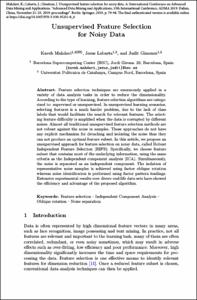Mostra el registre d'ítem simple
Unsupervised feature selection for noisy data
| dc.contributor.author | Mahdavi, Kaveh |
| dc.contributor.author | Labarta Mancho, Jesús José |
| dc.contributor.author | Giménez, Judit |
| dc.contributor.other | Universitat Politècnica de Catalunya. Doctorat en Arquitectura de Computadors |
| dc.contributor.other | Universitat Politècnica de Catalunya. Departament d'Arquitectura de Computadors |
| dc.contributor.other | Barcelona Supercomputing Center |
| dc.date.accessioned | 2020-05-04T12:15:40Z |
| dc.date.available | 2020-05-04T12:15:40Z |
| dc.date.issued | 2019 |
| dc.identifier.citation | Mahdavi, K.; Labarta, J.; Giménez, J. Unsupervised feature selection for noisy data. A: International Conference on Advanced Data Mining and Applications. "Advanced Data Mining and Applications, 15th International Conference, ADMA 2019: Dalian, China, November 21–23, 2019: proceedings". Berlín: Springer, 2019, p. 79-94. |
| dc.identifier.isbn | 978-3-030-35231-8 |
| dc.identifier.uri | http://hdl.handle.net/2117/186164 |
| dc.description.abstract | Feature selection techniques are enormously applied in a variety of data analysis tasks in order to reduce the dimensionality. According to the type of learning, feature selection algorithms are categorized to: supervised or unsupervised. In unsupervised learning scenarios, selecting features is a much harder problem, due to the lack of class labels that would facilitate the search for relevant features. The selecting feature difficulty is amplified when the data is corrupted by different noises. Almost all traditional unsupervised feature selection methods are not robust against the noise in samples. These approaches do not have any explicit mechanism for detaching and isolating the noise thus they can not produce an optimal feature subset. In this article, we propose an unsupervised approach for feature selection on noisy data, called Robust Independent Feature Selection (RIFS). Specifically, we choose feature subset that contains most of the underlying information, using the same criteria as the Independent component analysis (ICA). Simultaneously, the noise is separated as an independent component. The isolation of representative noise samples is achieved using factor oblique rotation whereas noise identification is performed using factor pattern loadings. Extensive experimental results over divers real-life data sets have showed the efficiency and advantage of the proposed algorithm. |
| dc.description.sponsorship | We thankfully acknowledge the support of the Comision Interministerial de Ciencia y Tecnologa (CICYT) under contract No. TIN2015-65316-P which has partially funded this work. |
| dc.format.extent | 16 p. |
| dc.language.iso | eng |
| dc.publisher | Springer |
| dc.subject | Àrees temàtiques de la UPC::Informàtica::Intel·ligència artificial::Aprenentatge automàtic |
| dc.subject.lcsh | Machine learning |
| dc.subject.lcsh | Data mining |
| dc.subject.other | Feature selection |
| dc.subject.other | Independent component analysis |
| dc.subject.other | Oblique rotation |
| dc.subject.other | Noise separation |
| dc.title | Unsupervised feature selection for noisy data |
| dc.type | Conference report |
| dc.subject.lemac | Aprenentatge automàtic |
| dc.subject.lemac | Mineria de dades |
| dc.contributor.group | Universitat Politècnica de Catalunya. CAP - Grup de Computació d'Altes Prestacions |
| dc.identifier.doi | 10.1007/978-3-030-35231-8_6 |
| dc.description.peerreviewed | Peer Reviewed |
| dc.relation.publisherversion | https://link.springer.com/chapter/10.1007/978-3-030-35231-8_6 |
| dc.rights.access | Open Access |
| local.identifier.drac | 28080223 |
| dc.description.version | Postprint (author's final draft) |
| dc.relation.projectid | info:eu-repo/grantAgreement/MINECO//TIN2015-65316-P/ES/COMPUTACION DE ALTAS PRESTACIONES VII/ |
| local.citation.author | Mahdavi, K.; Labarta, J.; Giménez, J. |
| local.citation.contributor | International Conference on Advanced Data Mining and Applications |
| local.citation.pubplace | Berlín |
| local.citation.publicationName | Advanced Data Mining and Applications, 15th International Conference, ADMA 2019: Dalian, China, November 21–23, 2019: proceedings |
| local.citation.startingPage | 79 |
| local.citation.endingPage | 94 |


